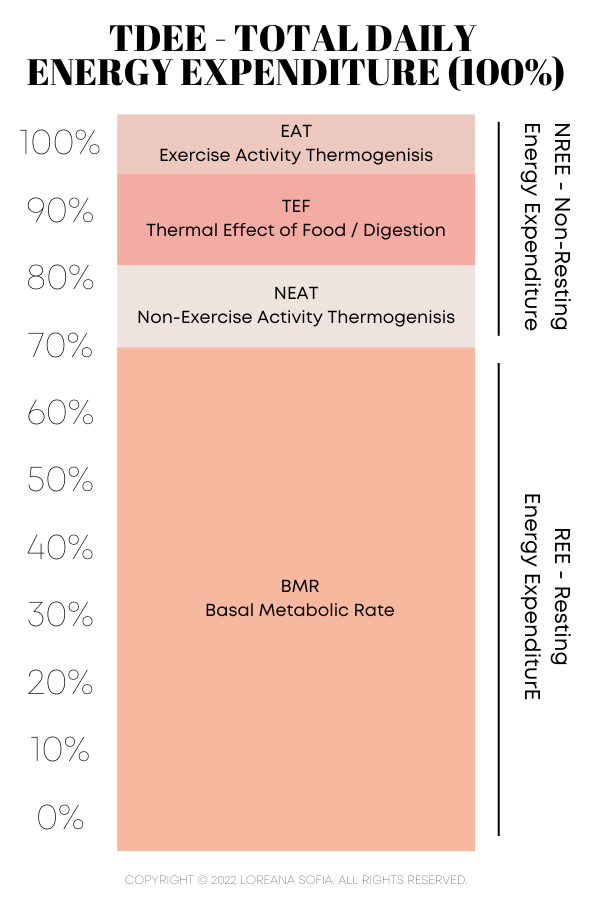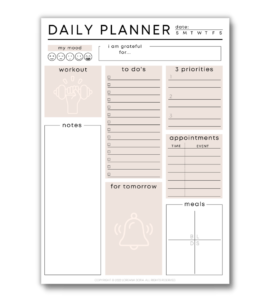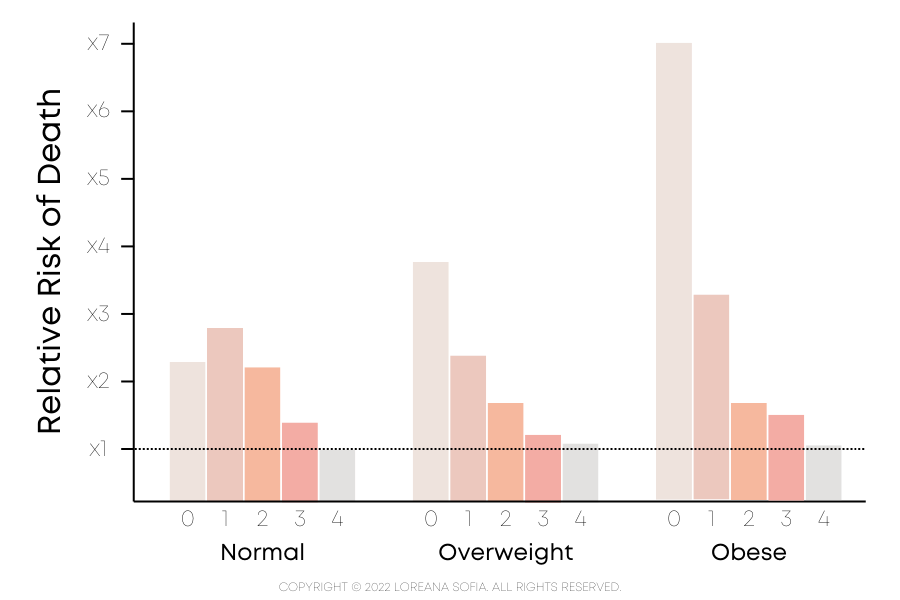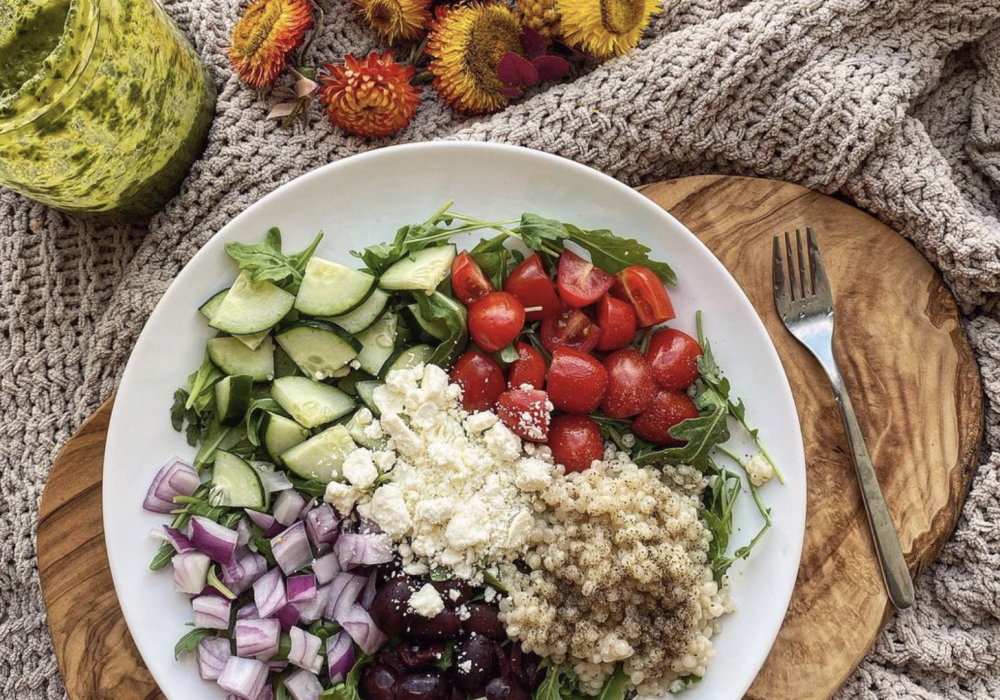These are the 9 nutrition facts that you need to understand if you’re trying to lose weight sustainably. Plus a few tips and tricks along the way.

About 1 year ago, I took a decision that changed my life: I deleted MyFitnessPal.
Until that moment, everything I ate went through that app; I was obsessed with counting every single calorie. Because it went on long enough, it developed into a rather significant eating disorder.
However, I convinced myself that that wasn’t the case. Because I was eating a respectable amount (aka not starving myself) and allowed myself to eat whatever I wanted as long as it fit into my plan, I truly believed this was normal.
Over time, this became harder. The only thing that I was thinking about was food: my whole day revolved around it! To top it off, I kept falling off the wagon. Whenever I ate something that I didn’t track (even something as small as a lollipop), the day would end in a huge binge.
But then, from one day to the other, I became painfully aware that the source of all these headaches (literal and figurative) was MyFitnessPal. So I deleted it.
And it changed my life for the better (x1000).
If you are someone who has struggled with such a pattern, then this is written for you. Here, I will be presenting all the nutrition facts that have helped me consistently lose weight (more than I ever have) without having to track or count a single calorie.
This blog post is all about the nutrition facts that you need to be aware of and understand to make intuitive eating and weight loss so much easier!
BEST NUTRITION FACTS FOR WEIGHT LOSS AND INTUITIVE EATING
1. Understand how you actually burn calories throughout the day
There is a huge misconception that the time of day in which you burn the most calories is while you’re exercising. This. Is. Not. True.
Actually, in the grand scheme of things, exercise is what burns the least amount of calories.
The chart below breaks down the total daily energy expenditure. In other words, it explains how much each activity contributes to the calories we burn in a day.

The Resting Energy Expenditure (REE) refers to the calories we burn when we are doing absolutely nothing. In other words, if we were to lay still one whole day, not eating or moving, we would still be burning our REE calories.
So what causes us to burn so many calories while laying absolutely still? Well, something has to keep us breathing, our heart pumping at a healthy rate, our hormones balanced, muscles repairing… All that required major energy usage! Indeed, the medulla is the part of our brains that is in charge of all things involuntary life-sustaining functions.
On the other hand, Non-Resting Energy Expenditure (NREE) refers to all the calories we burn by… doing stuff, like eating, exercising, working, cooking… whatever it is. All this activity refers to our NREE calories.
NREE is comprised of three sub-categories:
- Non-Exercise Activity Thermogenesis (NEAT) refers to any physical movement in which the end goal is NOT to exercise. Examples of this are gardening, walking in the supermarket, cooking…
- The Thermal Effect of Food (TEF) is all the energy that your body requires in order to digest anything you eat. Refer to Nutrition Fact #2 for more on this.
- Finally, Exercise Activity Thermogenesis (EAT) refers to all physical activity that is done with the goal of exercise. So running, going to the gym, swimming, playing basketball, etc.
The most important takeaway from the graph are the proportions of the NREE and NRE. Your body is burning over 70% (!!!!) of your daily calories through functions that you don’t even need to think about.
On the flip side, only 5% (!!!!!!!!) of your daily energy expenditure is done through exercise. Finally, the last 25% of the calories burnt is done through… just living your life.
The whole point of me mentioning this nutrition fact is for you to understand that exercise isn’t the most important part when it comes to burning calories.
What you want to do instead is find a way to make the BMR burn more calories so that your overall energy expenditure increases without you even having to put in the effort. Focus on what you eat (Nutrition Fact #2), and on increasing the amount of calories your metabolism burns (Nutrition Fact #4)
2. Proteins, proteins, proteins
Let me be the umpteenth person to tell you that you should prioritize proteins. Linking to Nutrition Fact #1, eating more proteins will help increase your TEF.
In any meal you have, you should always find a way to include protein some form of protein.
It is said that you should aim for approximately 20g of protein per meal, but I find that consuming ~60-80g of protein per day is far too low. I would push it to closer to 30-40 grams per meal, the equivalent of ~140 grams per day.
This being said, if you only find a way to include 20g or even just 10g of protein in your meal, that’s good too! For example, if you just want a snack, having 30-40grams of protein will be too much… almost the size of a full meal.
Another way of seeing how much protein you should eat it is by calculating 0.8-1.2 * (bodyweight in lbs) of protein per day. So if you weighed 135lbs, then you should eat in the range of 108g (135*0.8) to 162g (135*1.2) of protein per day
Ideas
Protein sources
30 to 40 grams of proteins looks like…
- 3 eggs for ~39 grams
- 4 ounces of chicken breast for ~40 grams
- 6 ounces of wild salmon for ~35 grams
- 6 ounces of greek yogurt for ~20 grams
- 5 ounces of shrimp for ~35 grams
- 4 ounces of sirloin steak for ~33 grams
- 1.5 cups of cooked lentils for ~27 grams
PLEASE keep in mind that certain protein sources are much higher in fats than others… therefore hitting about 30 to 40 grams will also entail many many more calories.
Examples of this are almonds or any other nuts. Yes, you can get 40 grams of proteins from almonds… but that also means 1000 calories. And it won’t fill you up much either. So it’s also a question of seeing which foods are more “calorie efficient”.
There are two main reasons why prioritizing protein will make weight loss so much easier:
- Proteins keep you fuller for longer. The reason for this is that eating proteins reduces levels of ghrelin, the hunger hormone, while boosting Peptide YY, the fullness hormone. This is a fancy fancy way of saying that you will feel full much sooner if eating proteins.
- Your body burns more calories by digesting proteins than it does anything other nutrients. This is called having a high thermic effect, whereby the body has to work harder in order to break down proteins. Referring back to the chart in Nutrition Fact #1, this is what would increase your TEF.

Want a free
DAILY PLANNER?
Start your day off by filling out this Daily Planner, and I can almost promise you that you’ll be significantly more productive. Fill out the form below and have the Daily Planner delivered straight to your inbox!
3. Understand that nutrition studies support intuitive eating
Okay, this is a really big topic I’m going to try to explain concisely. Eventually, I will be writing a whole blog post about this but I need to include it here.
Succinctly, there are SO MANY studies that show that following any form of diet is bound to fail, and actually leads to more weight gain down the road.
If you’re anything like me, you knew about this. But you told yourself that you’ll beat the odds, that your willpower is strong enough to overcome this, and that you’ll come out winning… and then when you fail and gain the weight back, you blame yourself. Sounds familiar?
Though some make it, willpower is a limited tool. And as many other things that are motivated just by willpower, they will soon come to an end when our attention shifts to something else.
So let me just back up my words with a little bit of science:
Some Science
Diets will eventually fail you
In Dr. Mann’s search for an effective obesity treatment, he concluded that diets are indeed not the answer. After 5 years, he found that for every 10 dieters:
- Only 1 came out having successfully lost weight
- 5 of them returned to their original weight
- 4 of them gained even more weight
Several other studies have shown that girls who have adopted a diet in their early teenage years are 3 TIMES more likely to become overweight even if they started at a normal weight.
Sadly, they have also found that the same indicators that predict this weight gain are also the ones that predict the development of eating disorders.
So the point of this is do not follow a diet. Practice intuitive eating. This is a long term process, but the only one that has shown to actually promote weight loss… or at least not encourage weight gain.
Here are a few questions you can ask yourself while practicing intuitive eating:
- What does my hunger feel like?
- What does my fullness feel like?
- Does this food actually taste good?
- Is this hunger or thirst?
- What food portion is enough for me? What is too much?
- Which foods make me feel good? Which make me feel drowsy?
Nutrition Coaching
Train hard. Eat well. Build your body one day at a time.
Train hard. Eat well.
Build your body one day at a time.
1-to-1 coaching. A sustainable nutrition plan. A lifetime of knowledge.
4. Food, exercise, cigarettes and alcohol: the 4 pillars
Being healthy and remaining at your ideal body weight is like riding a bike. Except that the floor is on fire, the wheels are on fire, and the bike is on fire.
Funny funny way of saying that being able to achieve your idea body weight is not rocket science. However, due to all those flimsy diet advertisements out there, it makes it hard to differentiate what you should and shouldn’t be doing.
To top it off, you’ll find research proving anything. You’ll find one proving that bananas are great for your health, and another one saying that they are basically poison. One says that you should never ever ever eat red meat unless you’re suicidal, and another one saying that it’s basically the food that allows us to live. It’s SO confusing.
My conclusion: too much of anything can make you sick. *Plays Cheryl Cole in the background*
But anyways, how do you deal with all this confusing? What are you supposed to do if everything will kill you and everything is the cure to mortality?
This Nutrition Fact is all about the 80/20 rule, AKA the Pareto Rule. Basically, this rule states that 80% of progress is done by 20% of the effort put into it. So if you can reap major benefits off of 20% of your efforts, let this be the effort:
- FOOD: eat a balance of proteins, fats and carbs
- EXERCISE: partake in some form of physical activity 3 times per week
- CIGARETTES: do not smoke
- ALCOHOL: drink in moderation.
Now, I’m not just pulling these pillars out of my a**. In a 14-year study about healthy lifestyle habits and mortality in overweight and obese individuals, results show how much of a positive impact adopting any of these habits can have on our lives.

As demonstrated by the chart above, we can see how the relative risk of death of normal weight, overweight and obese individuals responds to adding any one of the habits. Adopting even only one of them drastically improves your health.
Adopting all four of the habits, no matter what your weight is, brings you down to a normal risk of death.
This study shows how powerful small habits are in improving your overall health. Also, if you are just starting out, then this study can give you a roadmap of the small actionable habits that you can take in order to start your weight loss and sustainable eating journey.
5. Make sure to keep your calories and BMR high.
This Nutrition Fact refers to the BMR portion of the Total Daily Energy Expenditure from Nutrition Fact #1. As we’ve seen, this is what burns 70% of your daily calories, so we ought to find a way to increase it.
Your body is always looking to find balance and accommodate best to what you are repeatedly doing.
If your body is used to always getting 2300 calories per day, then it will get used to living off of 2300 calories a day. This means that it will try to neither gain nor lose weight by eating 2300 calories a day. In this context, maintaining your weight at 2300 calories is not bad at all.
On the flip side, what happens if you only feed it 1200 calories? Your body will strive to neither gain nor lose weight eating only 1200 calories! I don’t know if you have any idea how little 1200 calories is… but it’s not a lot. You cannot possibly get all the nutrients your body needs with only 1200 calories.
And beyond that, have fun dropping your calories even lower than 1200 calories in order to lose weight. It’s just not feasible, and it is definitely not healthy.
So, by lowing the calories this much, your BMR will have to get used to living off of and burn off much less than it ought to. This is what we called a depressed metabolism. Sure, you will have lost a bunch of weight (and as seen in Nutrition Fact #3, you will have gained it all back soon enough), but your body will be burning so many fewer calories.
In fact, Dr. Rudolph Leibel from Columbia University studied how our energy expenditure changes after changes in our body weight. He found that people who have dropped 10% of their original body weight – no matter if they started off skinny or obese – burn 300-450 fewer calories per day. And for those who know anything about calories… you know that that’s a lot of food.
Basically, the solution to weight loss is NOT to lower your calories as much as you can. It’s to keep them at a good level, I would say a minimum of 1700 calories- but this vastly depends on the person… some people’s minimum is in the 3000 calories so there’s no comparing.
Another way of seeing things
BMR and Food
Think of your body like your house’s thermostat.
The thermostat in your house is there to keep the inside of your house at the same temperature year-round, no matter what the weather is like outside.
So say that you like your house at 21 degrees: you set the thermostat at 21 degrees.
Sometimes, you might want to open a window to get some fresh air in winter. Well, since you open it for a couple of minutes, the thermostat will have to work a little bit harder for a few minutes. As soon as you close the window, the thermostat will be able to go back to its regular work pattern.
However, what happens when you keep that window open all the time? Your thermostat will have to work extra hard for a very long time.
Eventually, you will have to increase the thermostat to 26 degrees in order to compensate for the cold air coming in.
Now, the thermostat’s settings have changed.
This is what might happen if you drop your calories too much. You’ll be rewiring your entire body to get used to something different. Eventually, your body will get used to it… so make sure not to lower the calories your body is used to.
6. Compare your weight loss journey to Newton's Cradle.
You know that in order to lose weight, you need to be burning off more calories than you eat (calories in < calories out). However, we’ve seen in Nutrition Fact #5 that we can’t lower them too much in order to avoid a depressed metabolism.
So how do you lose weight?
Well, you have to be in a calorie deficit, but in a SMALL calorie deficit. I’m talking 50-200 calories. This is big enough for you to see a difference in the long run but small enough for you to be doing it consistently without starving yourself.
Why do you want it to be this small? Well, let me introduce you to Newton’s Cradle.
I’m sure you know it. It’s 5 marbles hanging side by side. You pick up one of the marbles in the extremities, and you swing it so it hits the marble beside it. Then, the marble on the other extremity swings up as high as you first swung the marble.
What I’m trying to say by this is that every action you take will have an equal and opposite reaction. You swing one marble up 45 degrees, well the other will also wing up and down 45 degrees.
The same thing happens when you diet – or when you do anything in life.
If your diet consists of basically starving yourself, then, sure enough, you’ll lose a ton of weight. But what’s the opposite effect? Well, you’ll end up gaining all that weight back, and possibly more, and you’ll end up in a massive binge.
Instead, just swing the marble up 5 degrees; be in a 50-200 calorie deficit. You won’t be losing massive amounts of weight immediately, but you’ll see an amazing difference long term.
And what’s the opposite reaction? You’ll eat an extra candy bar one day? You’ll eat one hog dog more than your fullness level? Whatever it is, it’ll be negligible in your weight loss progress.
To be fully honest, I apply this analogy to everything n my life. You work out 3 hours a day for 1 month… then the next month you won’t even go near a gym. You study non-stop for 1 whole year, neglecting any other needs you have? Well, burnout ahoy.
Newton’s cradle baby. Just think of that.
7. Eating more one day won't make you gain it all back
When I first heard of this, it drastically improved the way I talked to myself when I overate.
It takes YEARS for someone to lose weight consistently: what makes you think that overeating one time will make you gain weight in ONE day? Overeating once will not reverse all the effort you’ve put into your weight loss.
It’ll all about the habits that you do consistently. Be kind to yourself <3
Want a free
MONTHLY HABIT TRACKER?
Set out small goals for yourself and see how your day-to-day improves with this Monthly Habit Tracker. Fill out the form below and have the Habit Tracker delivered straight to your inbox!
8. It'll be a long term process... and it won't be easy
This is one of the sucky-er nutrition facts.
Sustainable weight loss is a very long-term process. There will be ups and downs.
And if you’re a woman, then you’ll have things like your periods to deal with, and we all know the absolute whirlwind of hormones and bloating that that entails.
Workout out for weight loss is one thing… but from my experience, it’s the eating right that is the hardest part.
The reason I’m bringing this up isn’t because I want to pull you down by saying that it’ll be hard… but simply to let you know that you aren’t alone. It was hard, and still is hard, for me and for many others.
Honestly, there’s no solution to this, and we all develop different methods of coping with it. Weight loss can be a really tricky thing on our minds and the way we see ourselves is likely to be different than what the reality is. Remember, all things in balance… refer back to Nutrition Fact #6.
You aren’t alone in this, and you aren’t a failure for sometimes eating too much <3
9. There will be times where you'll want the quick fix
This. Is. Normal.
This. Is. So. So. Normal.
I used to think that I was such a failure for sometimes thinking this way. I used to really hate myself for thinking about wanting a quick fix to weight loss.
It’ll happen, and it’ll suck.
Again, you aren’t alone in this. It can be SO tempting to drop your calories by 1000 in order to drop weight quickly. But please remember that long term, it won’t work out, and it isn’t healthy for you.
I have suffered and still deal with eating disorders and body dysmorphia. And to put it crudely, I’ve checked to see near liposuction institutions quite a few times. It’s so tempting and it can get really hard.
But you will get through this. You are not alone. I’m here if you need to chat.
Treat yourself like you would someone you love. <3
I hope this blog post has been helpful to you or at least allowed you to treat yourself with kindness.
This blog post was all about the best nutrition facts that you need to understand for sustainable weight loss.
Share this post








